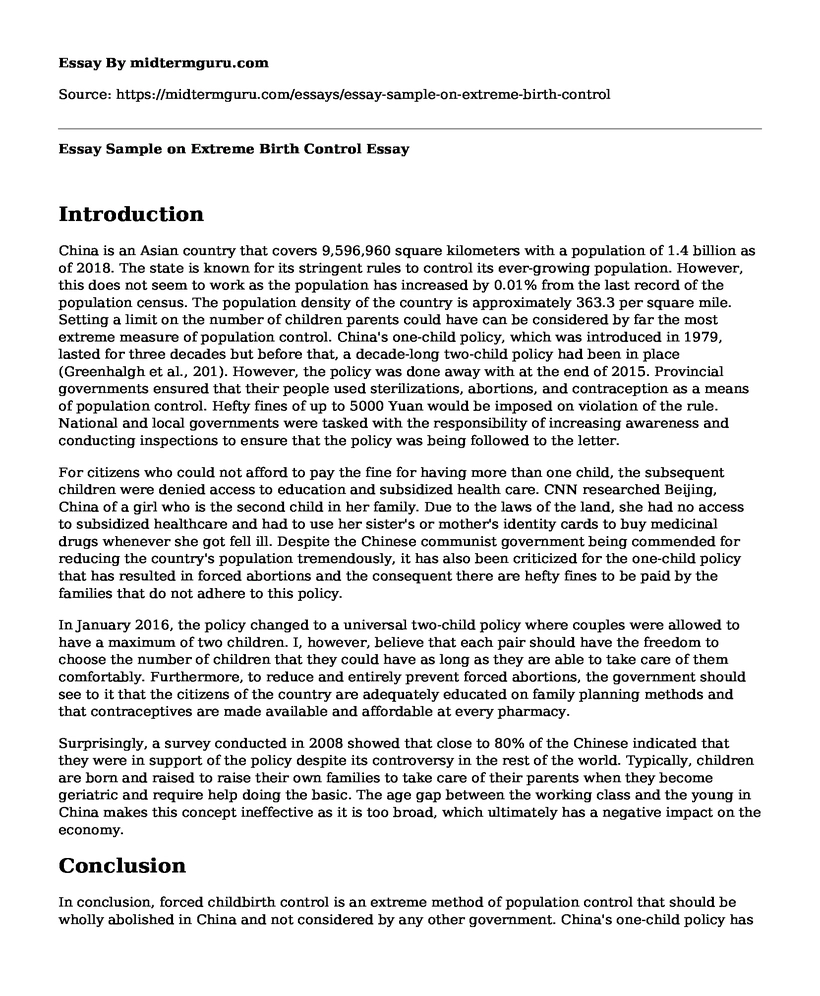Introduction
China is an Asian country that covers 9,596,960 square kilometers with a population of 1.4 billion as of 2018. The state is known for its stringent rules to control its ever-growing population. However, this does not seem to work as the population has increased by 0.01% from the last record of the population census. The population density of the country is approximately 363.3 per square mile. Setting a limit on the number of children parents could have can be considered by far the most extreme measure of population control. China's one-child policy, which was introduced in 1979, lasted for three decades but before that, a decade-long two-child policy had been in place (Greenhalgh et al., 201). However, the policy was done away with at the end of 2015. Provincial governments ensured that their people used sterilizations, abortions, and contraception as a means of population control. Hefty fines of up to 5000 Yuan would be imposed on violation of the rule. National and local governments were tasked with the responsibility of increasing awareness and conducting inspections to ensure that the policy was being followed to the letter.
For citizens who could not afford to pay the fine for having more than one child, the subsequent children were denied access to education and subsidized health care. CNN researched Beijing, China of a girl who is the second child in her family. Due to the laws of the land, she had no access to subsidized healthcare and had to use her sister's or mother's identity cards to buy medicinal drugs whenever she got fell ill. Despite the Chinese communist government being commended for reducing the country's population tremendously, it has also been criticized for the one-child policy that has resulted in forced abortions and the consequent there are hefty fines to be paid by the families that do not adhere to this policy.
In January 2016, the policy changed to a universal two-child policy where couples were allowed to have a maximum of two children. I, however, believe that each pair should have the freedom to choose the number of children that they could have as long as they are able to take care of them comfortably. Furthermore, to reduce and entirely prevent forced abortions, the government should see to it that the citizens of the country are adequately educated on family planning methods and that contraceptives are made available and affordable at every pharmacy.
Surprisingly, a survey conducted in 2008 showed that close to 80% of the Chinese indicated that they were in support of the policy despite its controversy in the rest of the world. Typically, children are born and raised to raise their own families to take care of their parents when they become geriatric and require help doing the basic. The age gap between the working class and the young in China makes this concept ineffective as it is too broad, which ultimately has a negative impact on the economy.
Conclusion
In conclusion, forced childbirth control is an extreme method of population control that should be wholly abolished in China and not considered by any other government. China's one-child policy has led to numerous forced abortions and an age gap detrimental to the economy as well as life in old age in China.
Works Cited
Greenhalgh, Susan, and Winckler, Edwin A. Governing China's Population: From Leninist to Neoliberal Biopolitics. Stanford University Press, 2005.
Ke, Feng and Hunt, Katie. The Girl with no identity: Being a Second Child in China, 11th November 2013." "https://www.cnn.com/2013/11/10/world/asia/china-second-child/index.html
Cite this page
Essay Sample on Extreme Birth Control. (2022, Oct 03). Retrieved from https://midtermguru.com/essays/essay-sample-on-extreme-birth-control
If you are the original author of this essay and no longer wish to have it published on the midtermguru.com website, please click below to request its removal:
- Essay on Marriage in Jewish Law
- Identification and Prevention of Risk Behavior in Sexual Abuse Adolescents Diagnosed with Depression and PTSD
- Do Treatment of Prisoners Matter in Society? - Essay Sample
- Immigration: Growing Concerns in U.S. and Beyond - Essay Sample
- Different Types of Divorce - Essay Sample
- Research Paper on Social Change: A Collaborative Effort Through Action Research
- Effective Communication for Improved Outcomes in Healthcare - Essay Sample







